Communications
Pulitzer Prize Winning Columnist Leonard Pitts Teaching Opinion Writing Class

Pulitzer Prize-winning columnist Leonard Pitts Jr is teaching the opinion writing course at the American University School of Communication (AU SOC) this fall – a lucky turn for some students. Pitts is well equipped for this work – besides a 43 year career in writing, he received the 2004 Pulitzer Prize for commentary, among many other awards.
Prior to this teaching experience, Pitts has taught at Morgan State University, Hampton University, Ohio University, Virginia Commonwealth University, Princeton University, the University of Maryland and George Washington University.
Pitts started his career in the 1970s as a music writer and critic for magazines and the Miami Herald, where he transitioned to writing an opinion column in 1994. This syndicated weekly column is one the most widely read of its type in the country, and nabbed Pitts his Pulitzer in 2004. It covers “pretty much everything,” according to Pitts, including “issues of race, gender, sexuality, religion, politics and morality.” He says that the most difficult thing about writing a column is shaping the topic, but what is most rewarding “are those rare instances when someone admits that your writing changed their minds.”
Pitts is also the bestselling author of several novels. The most recent The Last Thing You Surrender (2019), is the story of three characters from the Jim Crow South living during World War II, where they confront racial conflict at home and on the front lines. His past novels include Before I Forget (2006), Freeman (2009), Grant Park (2016), along with the nonfiction Becoming Dad and the column collection Forward From This Moment (2009).
But Pitts would tell you that he has been a writer his whole life – since the age of 5, to be specific. Pitts said he believes that writing is the best conveyor of ideas, especially the ones that are more difficult for people to process. Being able to create change and spread ideas is impossible without the ability to write in a clear, persuasive fashion. That captures to the craft; he wants to pass on his knowledge. He sums it up in a few simple words: “Why writing? Why not writing?” In his class, Pitts hopes that his students learn to “express their opinions concisely, persuasively and with logic and fairness,” but always keep their writing compelling.
